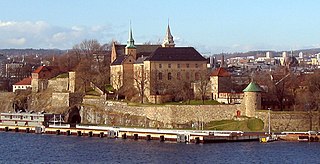
Akershus is a county in Norway, with Oslo as its main city and capital. It is named after the Akershus Fortress in Oslo. From the middle ages to 1919, Akershus was a fief and main county that included most of Eastern Norway, and from the 17th century until 2020 and again from 2024, Akershus also has a more narrow meaning as a smaller central county in the Greater Oslo Region. In 2020, the county of Akershus was merged into Viken along with the counties of Østfold and Buskerud. In 2022, the Storting voted to dissolve Viken and reestablish Akershus county. Akershus was reestablished in 2024.

Eidsvoll is a municipality in Akershus county, Norway. It is part of the Romerike traditional region. The administrative centre of the municipality is the village of Sundet.

Fåvang Stave Church is a parish church of the Church of Norway in Ringebu Municipality in Innlandet county, Norway. It is located just south of the village of Fåvang. It is the main church for the Fåvang parish which is part of the Sør-Gudbrandsdal prosti (deanery) in the Diocese of Hamar. The brown, wooden church was built in a cruciform design in the year 1630 using plans drawn up by the architect Werner Olsen. The church seats about 170 people.
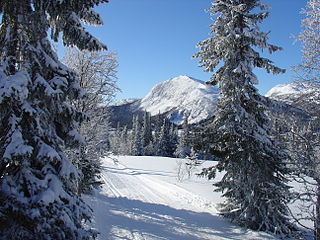
Eggedal is a valley and parish in Buskerud county, Norway. It consisting of the northwestern half of the municipality of Sigdal.

Vy Gjøvikbanen AS is a Norwegian railway company that operates the passenger train service on the Gjøvik Line. A subsidiary of the state-owned Vy, it operates a fleet of nine Class 69g three-car electric multiple units. NSB Gjøvikbanen provides two different services: the Skøyen – Oslo S – Jaren service is part of the Oslo Commuter Rail; while Oslo S – Gjøvik is a regional service, with only limited stops on the route until Grua. Departures are each 40 minutes, with every third train running to Gjøvik.

Oslo Commuter Rail is a commuter rail centered in Oslo, Norway, connecting the capital to six counties in Eastern Norway. The system is operated by Vy and its subsidiary Vy Gjøvikbanen, using Class 69 and Class 72 electric multiple units (EMU). The network spans eight routes and 128 stations, with Oslo Central Station (Oslo S) as the central hub. The trains run on 553 kilometers (344 mi) of electrified mainline railway owned by the Bane NOR. Deficits are financed by the Norwegian Ministry of Transport, although the network also has a ticketing cooperation with Ruter, the public transport authority in Oslo and Akershus. The network is the longest commuter rail network in the Nordic countries, and among top ten in Europe.

Varingskollen is a mountain of Akershus, Norway. It is situated above the village of Hakadal in Nittedal. it is the site of the Varingskollen ski resort located 25 minutes by train from Oslo on the Gjøvik Line with exit at the Hakadal Station.
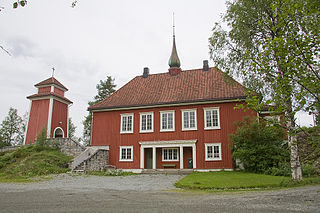
Løkken Church is a parish church of the Church of Norway in Orkland municipality in Trøndelag county, Norway. It is located in a rural area between the nearby villages of Bjørnli and Løkken Verk. It is the church for the Løkken parish which is part of the Orkdal prosti (deanery) in the Diocese of Nidaros. The red, wooden church was built in a long church style in 1929 using plans drawn up by the architect Roar Tønseth. The church seats about 170 people.

Fiskum is a parish in the municipality Øvre Eiker in Buskerud, Norway.

Vår Frue Church is a medieval parish church of the Church of Norway in Trondheim municipality in Trøndelag county, Norway. It is located in the downtown Midtbyen area of the city of Trondheim, just a few blocks north of the Nidaros Cathedral. It is one of the two churches for the Nidaros og Vår Frue parish which is part of the Nidaros domprosti (arch-deanery) in the Diocese of Nidaros. The gray, stone church was built in a long church design in the late 1100s using plans drawn up by Bjørn Sigvardsson. The church seats about 540 people.
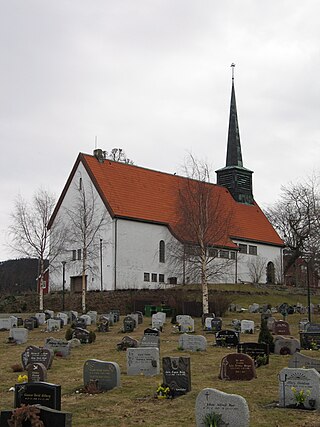
Ranheim Church is a parish church of the Church of Norway in Trondheim municipality in Trøndelag county, Norway. It is located in the village of Ranheim, east of the city of Trondheim. It is one of the churches for the Ranheim og Charlottenlund parish which is part of the Strinda prosti (deanery) in the Diocese of Nidaros. The white, stone church was built in a cruciform style using plans drawn up by the architect Roar Tønseth (1895-1985). The church seats about 200 people.

Alstadhaug Church is a parish church of the Church of Norway in the village of Alstadhaug, in Levanger municipality in Trøndelag county. It is the church for the Alstadhaug parish, which is part of the Stiklestad prosti (deanery) in the Diocese of Nidaros. The church was built in a long church style during the 12th century by an unknown architect. The church seats about 238 people.

Old Sakshaug Church is a preserved, former parish church of the Church of Norway in Inderøy municipality in Trøndelag county, Norway. It is located in the village of Sakshaug, just west of the municipal centre of Straumen. It is the former main church for the Inderøy parish which is part of the Stiklestad prosti (deanery) in the Diocese of Nidaros. The stone church was built in a long church style around the year 1184 using plans drawn up by an unknown architect. The church seats about 200 people.

For Church is a parish church of the Church of Norway in Steinkjer municipality in Trøndelag county, Norway. It is located in Stod, just southwest of the village of Binde. It is the church for the Stod parish which is part of the Stiklestad prosti (deanery) in the Diocese of Nidaros. The white, plastered stone church was built in a long church style in 1846 using plans drawn up by the architect Hans Linstow (1787–1851). The church seats about 400 people.

Mære Church is a parish church of the Church of Norway in Steinkjer municipality in Trøndelag county, Norway. It is located in the village of Mære. It is the church for the Mære parish which is part of the Stiklestad prosti (deanery) in the Diocese of Nidaros of the Church of Norway. The white, plastered stone church was built in a long church style during the 12th century using plans drawn up by an unknown architect. The church seats about 310 people.

Ranem Church is a parish church of the Church of Norway in Overhalla Municipality in Trøndelag county, Norway. It is located in the village of Ranemsletta. It is the church for the Ranem parish which is part of the Namdal prosti (deanery) in the Diocese of Nidaros. The medieval era, marble and stone church was built in a long church design in the mid-12th century using plans drawn up by an unknown architect. The church seats about 200 people.
Herman Krefting was a German born, Norwegian ironworks pioneer.

Eidsberg Church is a parish church located at Eidsberg in Østfold county, Norway. The Church is located down to the river Glomma by the side of the County Road 124. Eidsberg Church is associated with the Østre Borgesyssel deanery of the Diocese of Borg.
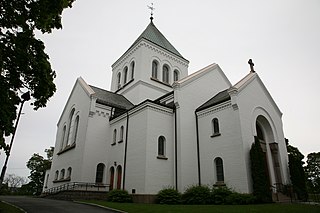
Ullern Church is a cruciform Romanesque church on the Holgerslyst property in the Ullern borough of Oslo, Norway. It is the parish church for the Ullern congregation in the Vestre Aker Deanery of the Diocese of Oslo.

Old Kviteseid Church is a parish church of the Church of Norway in Kviteseid Municipality in Vestfold og Telemark county, Norway. It is located about 4 kilometres (2.5 mi) north of the village of Eidstod. It is one of the churches in the Kviteseid parish which is part of the Øvre Telemark prosti (deanery) in the Diocese of Agder og Telemark. The white, stone church was built in a long church design around the year 1260 using plans drawn up by an unknown architect. The church seats about 150 people. This is among the better preserved stone churches in Telemark.



















